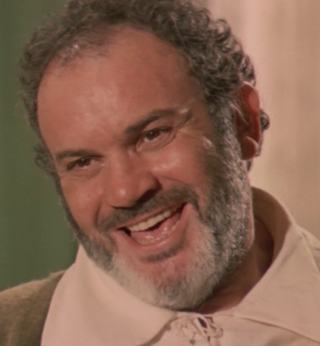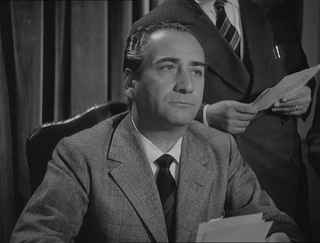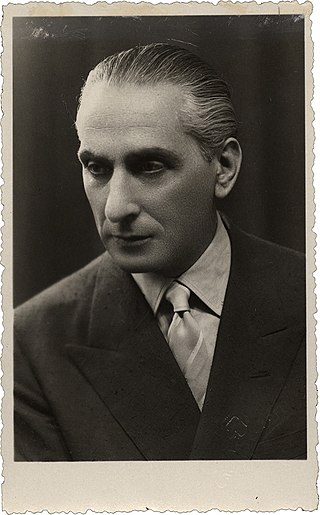Related Research Articles

Giovanni Rota Rinaldi, better known as Nino Rota, was an Italian composer, pianist, conductor and academic who is best known for his film scores, notably for the films of Federico Fellini and Luchino Visconti. He also composed the music for two of Franco Zeffirelli's Shakespeare screen adaptations, and for the first two installments of Francis Ford Coppola's The Godfather trilogy, earning the Academy Award for Best Original Score for The Godfather Part II (1974).

Un ballo in maschera is an 1859 opera in three acts by Giuseppe Verdi. The text, by Antonio Somma, was based on Eugène Scribe's libretto for Daniel Auber's 1833 five act opera, Gustave III, ou Le bal masqué.

Giuseppe Di Stefano was an Italian operatic tenor who sang professionally from the mid-1940s until the early 1990s. Called "Pippo" by both fans and friends, he was known as the "Golden Voice" or "The Most Beautiful Voice", as the true successor of Beniamino Gigli. Luciano Pavarotti said he modeled himself after Di Stefano. In an interview Pavarotti said "Di Stefano is my idol. There is a solar voice...It was the most incredible, open voice you could hear. The musicality of Di Stefano is as natural and beautiful as the voice is phenomenal". Di Stefano was also the tenor who most inspired José Carreras. He died on 3 March 2008 as a result of injuries from an attack by unknown assailants.

Mario Brega was an Italian character actor. His heavy build meant that he regularly portrayed a thug in his films, particularly earlier in his career in westerns. Later in his career, however, he featured in numerous Italian comedy films. Brega stood at 6 feet 4 inches (1.93 m) and well over 250 pounds (110 kg) at his heaviest but after the 1960s slimmed down significantly.

Riccardo Bacchelli was an Italian writer. In 1927 he was one of the founders of the review La Ronda and Bagutta Prize for literature. He was nominated for the Nobel Prize in Literature eight times.
The Nastro d'Argento is a film award assigned each year, since 1946, by Sindacato Nazionale dei Giornalisti Cinematografici Italiani, the association of Italian film critics.

Mauro Maur, OMRI is an Italian trumpeter and composer. He has collaborated alongside musicians such as Ennio Morricone, Placido Domingo, Uto Ughi, Riccardo Muti, Leonard Bernstein, Seiji Ozawa, and Pierre Boulez.
Diletta Rizzo Marin is an Italian operatic mezzo-soprano admired for the quality of her voice and her skills in acting. She has appeared frequently at the Festival Internacional de Santander.

Bruno Bettinelli was an Italian composer and teacher.

Riccardo Fogli is an Italian singer-songwriter.

Nino Marchetti was an Italian film actor. He appeared in 66 films between 1934 and 1973.

Mariella Adani is an Italian classical soprano who had an active career in operas, concerts, and recitals from the 1950s through the 1980s. She has sung under the musical direction of Vittorio Gui, Carlo Maria Giulini, Nino Sanzogno, Oliviero De Fabritiis, and Peter Maag and under the directors Sandro Bolchi, Franco Zeffirelli Luchino Visconti, and Walter Felsenstein. A light lyric soprano, she has particularly excelled in the operas of Wolfgang Amadeus Mozart and Gioachino Rossini. She has also been admired for her performances in Baroque opera. Retired from the stage, she now devotes her time to teaching singing.
I due timidi is a one-act radio opera composed in 1950 by Nino Rota with libretto by the film writer Suso Cecchi d'Amico.
Alfredo Nigro is an Italian tenor.
The Orobians are a ska band founded during 1997 in Bergamo, Italy and still based in Bergamo. They play ska and rocksteady standards with a modern jazz twist.

Paolo Poli was an Italian theatre actor. He has also acted in films and on television.
Quelli della notte was an Italian late night variety show, broadcast on Rai 2 in 1985.

Antonio Veretti was an Italian composer.
References
- ↑ Franco Sciannameo - Nino Rota's The Godfather Trilogy: A Film Score Guide 2010 155 1461664241 ... the 1959 one-act opera by Riccardo Bacchelli and Nino Rota entitled La Notte di un nevrastenico (A Neurasthenic Man's Night)